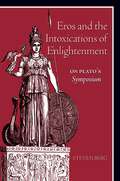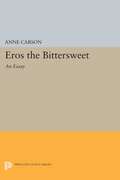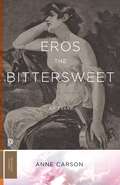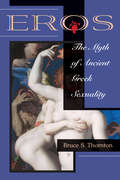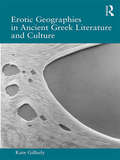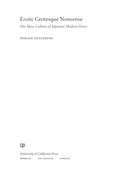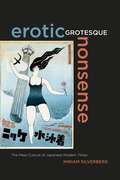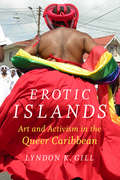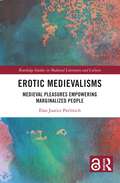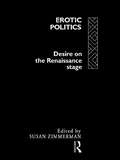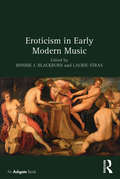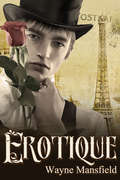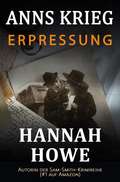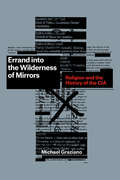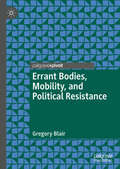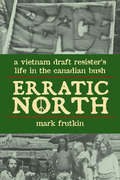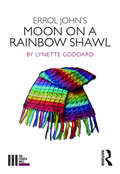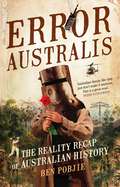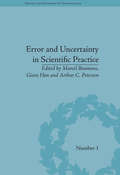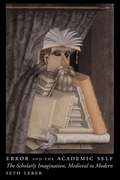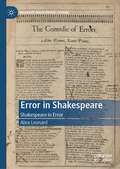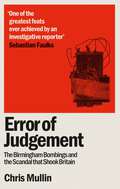- Table View
- List View
Eros and the Intoxications of Enlightenment: On Plato's Symposium (SUNY series in Ancient Greek Philosophy)
by Steven BergAn original analysis of one of Plato's most well-known and pivotal dialogues, this study is based upon the effort to think together the most manifest themes of the Symposium (the nature of eros and the relation between poetry and philosophy) with its less obvious but no less essential themes (the character of the city and the nature and limitations of sophistic enlightenment). Author Steven Berg offers an interpretation of this dialogue wherein all the speakers at the banquet—with the exception of Socrates—not only offer their views on the nature of love, but represent Athens and the Athenian enlightenment. Accordingly, Socrates' speech, taken in relation to the speeches that precede it, is shown to articulate the relation between Socrates and the Athenian enlightenment, to expose the limitations of that enlightenment, and therefore finally to bring to light the irresolvable tension between Socrates and his philosophy and the city of Athens even at her most enlightened.
Eros the Bittersweet: An Essay
by Anne CarsonThe insights presented in the volume are many and wide-ranging, recognizably in tune with the subtlest modern discussions of desire (such as triangulation. or loving what others love), yet offering new solutions to old problems, like the proper interpretation of Plato's Phaedrus. On the frequently discussed effect of literacy on Greek civilization, the book offers a fresh view: it was no accident that the poets who invented Eros were also the first readers and writers of the Western literate tradition.Originally published in 1989.The Princeton Legacy Library uses the latest print-on-demand technology to again make available previously out-of-print books from the distinguished backlist of Princeton University Press. These paperback editions preserve the original texts of these important books while presenting them in durable paperback editions. The goal of the Princeton Legacy Library is to vastly increase access to the rich scholarly heritage found in the thousands of books published by Princeton University Press since its founding in 1905.
Eros the Bittersweet: An Essay (Princeton Classics #130)
by Anne CarsonNamed one of the 100 best nonfiction books of all time by the Modern LibraryAnne Carson’s remarkable first book about the paradoxical nature of romantic loveSince it was first published, Eros the Bittersweet, Anne Carson’s lyrical meditation on love in ancient Greek literature and philosophy, has established itself as a favorite among an unusually broad audience, including classicists, essayists, poets, and general readers. Beginning with the poet Sappho’s invention of the word “bittersweet” to describe Eros, Carson’s original and beautifully written book is a wide-ranging reflection on the conflicted nature of romantic love, which is both “miserable” and “one of the greatest pleasures we have.”
Eros: The Myth Of Ancient Greek Sexuality
by Bruce S ThorntonEros: The Myth of Ancient Greek Sexuality is a controversial book that lays bare the meanings Greeks gave to sex. Contrary to the romantic idealization of sex dominating our culture, the Greeks saw eros as a powerful force of nature, potentially dangerous, and in need of control by society: Eros the Destroyer, not Cupid the Insipid, fired the Greek imagination.The destructiveness of eros can be seen in Greek imagery and metaphor, and in the Greeks' attitudes toward women and homosexuals. Images of love as fire, disease, storms, insanity, and violence?Top 40 song clich�for us?locate eros among the unpredictable and deadly forces of nature. The beautiful Aphrodite embodies the alluring danger of sex, while femmes fatales like Pandora and Helen represent the risky charms of female sexuality. And homosexuality typifies for the Greeks the frightening power of an indiscriminate appetite that threatens the stability of culture itself.In Eros: The Myth of Ancient Greek Sexuality, Bruce Thornton offers a uniquely sweeping and comprehensive account of ancient sexuality free of currently fashionable theoretical jargon and pretentions. In its conclusions the book challenges the distortions of much recent scholarship on Greek sexuality. And throughout it links the wary attitudes of the Greeks to our present-day concerns about love, sex, and family. What we see, finally, are the origins of some of our own views as well as a vision of sexuality that is perhaps more honest and mature than our own dangerous illusions.
Erotic Geographies in Ancient Greek Literature and Culture
by Kate GilhulyErotic Geographies in Ancient Greek Literature and Culture addresses the following question: how does a place "get a reputation?" The Athenians associated sexual behaviors with particular places and their inhabitants, and this book decodes the meaning of the sexualization of place and traces the repercussions of these projections. Focusing on Corinth, Sparta, and Lesbos, each section starts from the fact that there were comic joke words that made a verb out of a place name to communicate a sexual slur. Corinth was thought of as a hotbed of prostitution; Sparta was perceived as a hyper-masculine culture that made femininity a problem; Lesbos had varying historically determined connotations, but was always associated with uninhibited and adventurous sexuality. The cultural beliefs encoded in these sexualized stereotypes are unpacked. These findings are then applied to close readings, ultimately demonstrating how sensitivity to the erotics of place enables new interpretations of well-known texts. In the process of moving from individual word to culture to text, Erotic Geographies recovers a complex mode of identity construction illuminating the workings of the Athenian imaginary as well as the role of discourse in shaping subjectivity. Gilhuly brings together a deep engagement with the robust scholarly literature on sex and gender in Classics with the growing interest in cultural geography in a way that has never been done before.
Erotic Grotesque Nonsense
by Miriam SilverbergThis history of Japanese mass culture during the decades preceding Pearl Harbor argues that the new gestures, relationship, and humor of ero-guro-nansensu (erotic grotesque nonsense) expressed a self-consciously modern ethos that challenged state ideology and expansionism. Miriam Silverberg uses sources such as movie magazines, ethnographies of the homeless, and the most famous photographs from this era to capture the spirit, textures, and language of a time when the media reached all classes, connecting the rural social order to urban mores. Employing the concept of montage as a metaphor that informed the organization of Japanese mass culture during the 1920s and 1930s, Silverberg challenges the erasure of Japanese colonialism and its legacies. She evokes vivid images from daily life during the 1920s and 1930s, including details about food, housing, fashion, modes of popular entertainment, and attitudes toward sexuality. Her innovative study demonstrates how new public spaces, new relationships within the family, and an ironic sensibility expressed the attitude of Japanese consumers who identified with the modern as providing a cosmopolitan break from tradition at the same time that they mobilized for war.
Erotic Grotesque Nonsense: The Mass Culture of Japanese Modern Times
by Miriam SilverbergThis history of Japanese mass culture during the decades preceding Pearl Harbor argues that the new gestures, relationship, and humor erotic grotesque nonsense expressed a self-consciously modern ethos that challenged state ideology and expansionism.
Erotic Islands: Art and Activism in the Queer Caribbean
by Lyndon K. GillIn Erotic Islands, Lyndon K. Gill maps a long queer presence at a crossroads of the Caribbean. This transdisciplinary book foregrounds the queer histories of Carnival, calypso, and HIV/AIDS in the Republic of Trinidad and Tobago. At its heart is an extension of Audre Lorde's use of the erotic as theory and methodology. Gill turns to lesbian/gay artistry and activism to insist on eros as an intertwined political-sensual-spiritual lens through which to see self and society more clearly. This analysis juxtaposes revered musician Calypso Rose, renowned mas man Peter Minshall, and resilient HIV/AIDS organization Friends For Life. Erotic Islands traverses black studies, queer studies, and anthropology toward an emergent black queer diaspora studies.
Erotic Medievalisms: Medieval Pleasures Empowering Marginalized People
by Elan Justice PavlinichErotic Medievalisms exposes modern apparatuses of oppression, reclaims histories for marginalized people, and promotes more inclusive representations in popular culture. Modern representations of the Middle Ages—including Santiago García and David Rubín’s graphic novel, Beowulf; Lil Nas X’s music video for "Montero (Call Me by Your Name);" Patience Agbabi’s retelling of Chaucer’s The Miller’s Tale, entitled "The Kiss;" and some BDSM (bondage and discipline, dominance and submission, sadism and masochism) practices—challenge pervasive power structures that privilege heterosexual male dominance commonly associated with medieval origins in popular culture. This comparative study between medieval and modern texts foregrounds the sexual gratification of people who are typically excluded from representations of the Middle Ages, specifically women, people of color, and LGBTQ+ individuals. Erotic displays of marginalized people in medieval contexts disrupt prevalent forms of oppression rooted in institutions that censor human experiences and direct sexual desires toward social justice.
Erotic Politics: The Dynamics of Desire in the Renaissance Theatre
by Susan ZimmermanIdentifying the stage as a primary site for erotic display, these essays take eroticism in Renaissance culture as a paradigm for issues of sexuality and identity in early modern culture. Contributors examine how the Renaissance stage functioned as a decoder for erotic experience, both reinforcing and subverting expected sexual behaviour. They argue that the dynamics of theatrical eroticism served to deconstruct gender definitions, leaving conventional categories of sexuality blurred, confused - or absent. In seeking to reposition the conventions and subversions of gender and desire in terms of one another, these essays open up an attractive and distinctive perspective in cultural debate.
Eroticism in Early Modern Music
by Laurie Stras Bonnie BlackburnEroticism in Early Modern Music contributes to a small but significant literature on music, sexuality, and sex in sixteenth- and seventeenth-century Europe. Its chapters have grown from a long dialogue between a group of scholars, who employ a variety of different approaches to the repertoire: musical and visual analysis; archival and cultural history; gender studies; philology; and performance. By confronting musical, literary, and visual sources with historically situated analyses, the book shows how erotic life and sensibilities were encoded in musical works. Eroticism in Early Modern Music will be of value to scholars and students of early modern European history and culture, and more widely to a readership interested in the history of eroticism and sexuality.
Erotique
by Wayne MansfieldLaurence and Eduardo have been lovers for ten wonderful years, but in the past few months Eduardo has become distant. Still madly in love with his Brazilian hunk, Laurence tries everything he can think of to win Eduardo back. When he catches Eduardo being unfaithful with one of the young servants, Laurence’s world is turned upside down. An argument ensues and Eduardo disappears during the night.On his own for the first time in his life, Laurence decides to escape his memories of Eduardo by visiting Paris indefinitely. He stays at the new, opulent Hotel Regina where he meets Brenton, a fellow Brit. They visit the Moulin Rouge and afterwards, Brenton takes him to a club in the backstreets of Montmatre. Le Cul Noir is a men’s club where Laurence discovers he hasn’t been as outrageous as he previously thought.He grows to care for Brenton, but he’s surprised to find himself thinking more and more about Eduardo. He knows he can’t have them both, but does he try to forget all about the love of his life and stay in Paris? Or does he have to find the courage to say goodbye to Brenton and go in search of Eduardo -- a man who may be lost to him forever?
Erpressung (Anns Krieg #3)
by Hannah HoweWährend ihr Ehemann Emrys immer noch vermisst wird, muss sich Ann Morgan der Aussicht stellen, ihren ersten Hochzeitstag und Weihnachten allein zu verbringen. Aber ein Anruf von Alistair Blythe, einem jungen Mann, mit dem sie vor ihrer Heirat mit Emrys kurz ausgegangen ist, bringt sie auf eine Spur, die zu Mord, Begegnungen mit Schwarzhändlern und lebensbedrohlichen Situationen führt. Mit der Hilfe von Spion Charles Montagu und Detective Inspector Max Deveraux enthüllt Ann ein großes Geheimnis des Kriegs. Und während der Schnee an Weihnachten fällt, erhält sie ein Geschenk, das sie nie vergessen wird.
Errand into the Wilderness of Mirrors: Religion and the History of the CIA
by Michael GrazianoMichael Graziano’s intriguing book fuses two landmark titles in American history: Perry Miller’s Errand into the Wilderness (1956), about the religious worldview of the early Massachusetts colonists, and David Martin’s Wilderness of Mirrors (1980), about the dangers and delusions inherent to the Central Intelligence Agency. Fittingly, Errand into the Wilderness of Mirrors investigates the dangers and delusions that ensued from the religious worldview of the early molders of the Central Intelligence Agency. Graziano argues that the religious approach to intelligence by key OSS and CIA figures like “Wild” Bill Donovan and Edward Lansdale was an essential, and overlooked, factor in establishing the agency’s concerns, methods, and understandings of the world. In a practical sense, this was because the Roman Catholic Church already had global networks of people and safe places that American agents could use to their advantage. But more tellingly, Graziano shows, American intelligence officers were overly inclined to view powerful religions and religious figures through the frameworks of Catholicism. As Graziano makes clear, these misconceptions often led to tragedy and disaster on an international scale. By braiding the development of the modern intelligence agency with the story of postwar American religion, Errand into the Wilderness of Mirrors delivers a provocative new look at a secret driver of one of the major engines of American power.
Errand into the Wilderness of Mirrors: Religion and the History of the CIA
by Michael GrazianoMichael Graziano’s intriguing book fuses two landmark titles in American history: Perry Miller’s Errand into the Wilderness (1956), about the religious worldview of the early Massachusetts colonists, and David Martin’s Wilderness of Mirrors (1980), about the dangers and delusions inherent to the Central Intelligence Agency. Fittingly, Errand into the Wilderness of Mirrors investigates the dangers and delusions that ensued from the religious worldview of the early molders of the Central Intelligence Agency. Graziano argues that the religious approach to intelligence by key OSS and CIA figures like “Wild” Bill Donovan and Edward Lansdale was an essential, and overlooked, factor in establishing the agency’s concerns, methods, and understandings of the world. In a practical sense, this was because the Roman Catholic Church already had global networks of people and safe places that American agents could use to their advantage. But more tellingly, Graziano shows, American intelligence officers were overly inclined to view powerful religions and religious figures through the frameworks of Catholicism. As Graziano makes clear, these misconceptions often led to tragedy and disaster on an international scale. By braiding the development of the modern intelligence agency with the story of postwar American religion, Errand into the Wilderness of Mirrors delivers a provocative new look at a secret driver of one of the major engines of American power.
Errant Bodies, Mobility, and Political Resistance
by Gregory BlairThis book explores a type of wandering referred to as “errant bodies.” This form of wandering is intentional, without specific destination, and operates as a means of resistance against hegemonic forms of power and cultural prescriptions. Beginning with an examination of the character and particulars of being an errant body, the book investigates historical errant bodies including Ancient Greek Cynics, Punks, Baudelaire, Situationists, Earhart, Kerouac, Fuller, Baudrillard, Hamish Fulton, and Keri Smith. Being an errant body means stepping to the side of dominant culture, creating a potential means of political resistance in the technologically driven twenty-first century.
Erratic North: A Vietnam Draft Resister's Life in the Canadian Bush
by Mark FrutkinIn geology an erratic is a "boulder or rock formation transported some distance from its original source, as by a glacier." In award-winning novelist Mark Frutkin’s case, his movement from his native Cleveland. Ohio, was instigated by his wish to protest and resist the U.S. military draft during the Vietnam War, and his destination was Canada.An estimated 50,000 to 100,000 American Vietnam War draft resisters sought sanctuary in Canada. Many of these men stayed, became Canadian citizens, and have made significant contributions to the country, including writers such as William Gibson, George Fetherling, Keith Maillard, and Jay Scott; musicians Jesse Winchester and Jim Byrnes; children’s performer Eric Nagler; and radio personality Andy Barrie.Although this first nonfiction work by Mark Frutkin looks back at the circumstances and culture of the late 1960s and early 1970s that prompted the author to relocate to Canada, Erratic Northis about many other things. It’s also a lyrical meditation about "returning to nature" in the bush country of Quebec and an account of the crucible that forged one writer. Tying everything together, though, is the overarching theme of the book: a contemplation of humanity’s embrace of war and violence and the countervailing impulse to resist that embrace, specifically as seen in the experience of Frutkin himself; his grandfather Simon, who escaped Tsarist Russia and its military in the 1890s; and Louis Drouin, the Quebec farmer Frutkin bought his original farm from and who resisted conscription in World War II.
Errol John's Moon on a Rainbow Shawl (The Fourth Wall)
by Lynette GoddardErrol John wrote Moon on a Rainbow Shawl (1958) after becoming disillusioned about the lack of good roles for black actors on the British theatre scene. While this situation has only slightly improved since, his response has become the most revived black play in Britain, from its original production at the Royal Court in 1958, to the National Theatre in 2012. It depicts the lives of a black community living in poverty in a shared tenement yard in Port of Spain, Trinidad, in the mid-1940s, showing how each of the characters carries dreams of escaping to create better lives for themselves and their families. Lynette Goddard focuses on how the play articulates the narratives of migration that prompted many Caribbean people to uproot from their homes on the islands and move to the England in the post-war era. For some of them, these dreams of a new life became a reality, but they were experienced differently across genders and generations.
Error Australis: The Reality Recap of Australian History
by Ben PobjieWe're obsessed with reality television these days yet we so often neglect the greatest reality of all: the reality of our nation, and how it came to be. In Error Australis, TV columnist, comedian and history buff Ben Pobjie recaps the history of Australia from its humble beginnings as a small patch of rapidly cooling rock, to its modern-day status as one of the major powers of the sub-Asian super-Antarctic next-to-Africa region. Pobjie recognises that history can be as gripping as any reality show - as thrilling as it is to see Delta Goodrem's chair turn around, there is an argument that the Second World War was even more exciting - and like any good recapper, he provides an immediate, visceral sense of what it was like to be there in the moment at our nation's defining events. All historians know that it is only by looking at where we have been that we can understand who we are, what we stand for, and why nothing seems to work. Error Australis is a scholastic and side-splittingly funny account of a young nation that has spent many years seeking its place in the world, and almost as many years not liking what it has found.
Error Australis: The Reality Recap of Australian History
by Ben PobjieWe're engrossed with reality TV these days, yet we so often neglect the greatest reality of all: the reality of our nation and how it came to be. In Error Australis, TV columnist, comedian and history buff Ben Pobjie recaps the history of Australia from its humble beginnings as a small patch of rapidly cooling rock to its modern-day status as one of the major powers of the sub-Asian super-Antarctic next-to-Africa region. As thrilling as it is to see Delta Goodrem's chair turn around, there's an argument that World War Two was even more exciting and, like any good recapper, Pobjie provides an immediate, visceral sense of what it was like to be there in the moment at our nation's defining events.It is only by looking at where we have been that we can understand who we are, what we stand for and why nothing seems to work. Error Australis is a scholarly and hilarious account of a young nation that has spent many years seeking its place in the world, and almost as many years not liking what it has found.
Error and Uncertainty in Scientific Practice (History and Philosophy of Technoscience #1)
by Marcel Boumans Giora Hon Arthur C. PetersenAssessment of error and uncertainty is a vital component of both natural and social science. This edited volume presents case studies of research practices across a wide spectrum of scientific fields. It compares methodologies and presents the ingredients needed for an overarching framework applicable to all.
Error and the Academic Self: The Scholarly Imagination, Medieval to Modern
by Seth LererHow and why did the academic style of writing, with its emphasis on criticism and correctness, develop? Seth Lerer suggests that the answer lies in medieval and Renaissance philology and, more specifically, in mistakes. For Lerer, erring is not simply being wrong, but being errant, and this book illuminates the wanderings of exiles, émigrés, dissenters, and the socially estranged as they helped form the modern university disciplines of philology and rhetoric, literary criticism, and literary theory. Examining a diverse group that includes Thomas More, Stephen Greenblatt, George Hickes, Seamus Heaney, George Eliot, and Paul de Man, Error and the Academic Self argues that this critical abstraction from society and retreat into ivory towers allowed estranged individuals to gain both a sense of private worth and the public legitimacy of a professional identity.
Error in Shakespeare: Shakespeare in Error (Palgrave Shakespeare Studies)
by Alice LeonardThe traditional view of Shakespeare’s mastery of the English language is alive and well today. This is an effect of the eighteenth-century canonisation of his works, and subsequently Shakespeare has come to be perceived as the owner of the vernacular. These entrenched attitudes prevent us from seeing the actual substance of the text, and the various types of error that it contains and even constitute it. This book argues that we need to attend to error to interpret Shakespeare’s disputed material text, political-dramatic interventions and famous literariness. The consequences of ignoring error are especially significant in the study of Shakespeare, as he mobilises the rebellious, marginal, and digressive potential of error in the creation of literary drama.
Error of Judgement: The Birmingham Bombings and the Scandal That Shook Britain
by Chris Mullin'Very occasionally a journalist starts an avalanche with a single gunshot... Chris Mullin and his TV colleagues belong in the glorious company."-The Observer'One of the greatest feats ever achieved by an investigative reporter'-Sebastian Faulks, the Independent on Sunday'Whoever planted the bombs in Birmingham...also planted a bomb under the British legal establishment'-Robert Harris, Sunday TimesError of Judgment lit a fire under the establishment when it was first published, shattering the prosecution case against six Irishmen charged with the Birmingham Bombings and going on to change the course of British legal history.On the evening of 21st November 1974, bombs planted by the IRA in two crowded Birmingham pubs exploded, killing 21 people and injuring at least 170. Within a day of the explosion, six men - Paddy Hill, Gerry Hunter, Richard McIlkenny, Billy Power, Johnny Walker and Hughie Callaghan - were arrested and charged. All were found guilty.Methodically, with total clarity and a tone that is both gripping and impassioned, then investigative journalist Mullin unpicked every detail of the case, revealing gaping holes in the prosecution case and the horrifying consequences of an establishment determined to close ranks.Now 50 years on from the Birmingham Bombings and with new writing from Mullin, this classic edition of Error of Judgement tells the complete story of one of the most significant miscarriages of justice ever. As relevant now as it was when it was first published, it's an essential text on corruption, violence and bias in British policing and justice.
